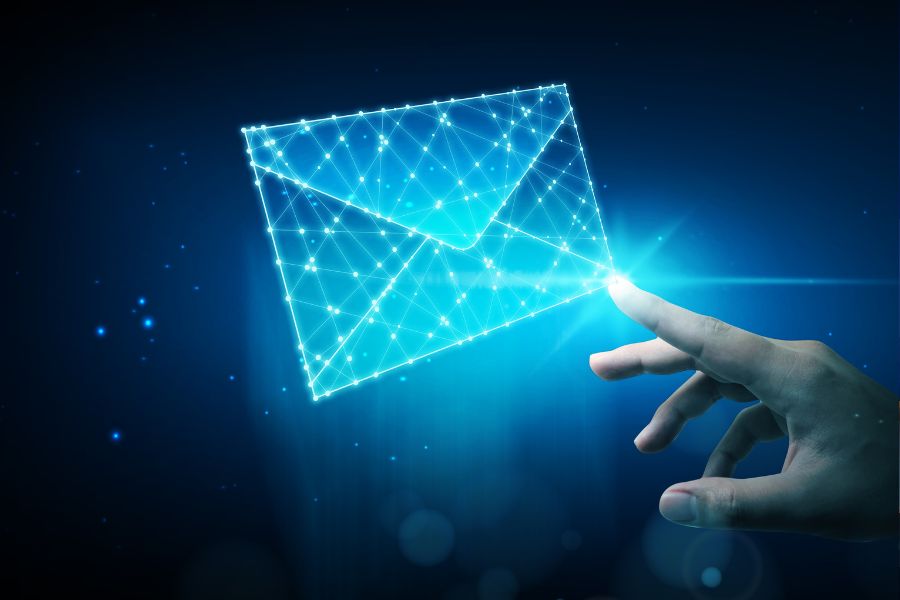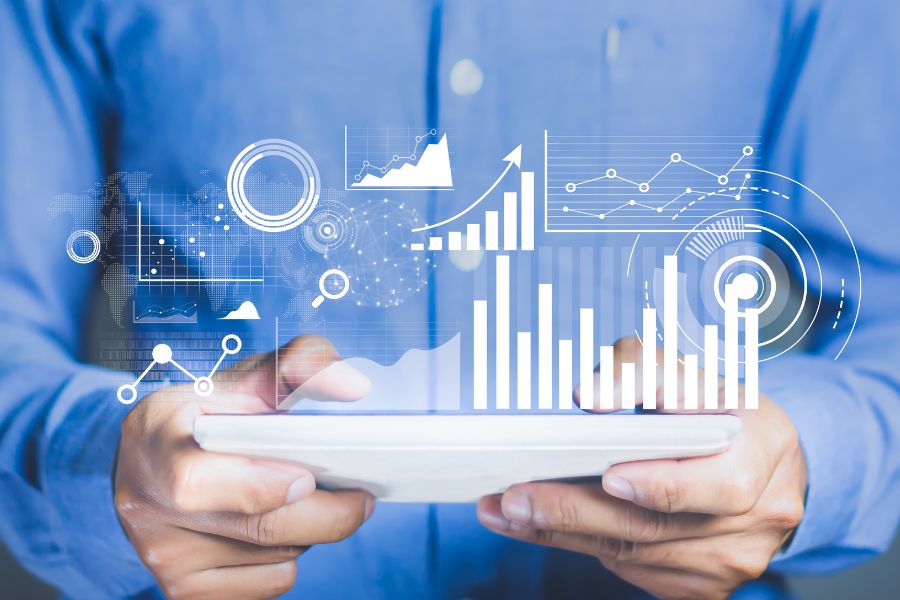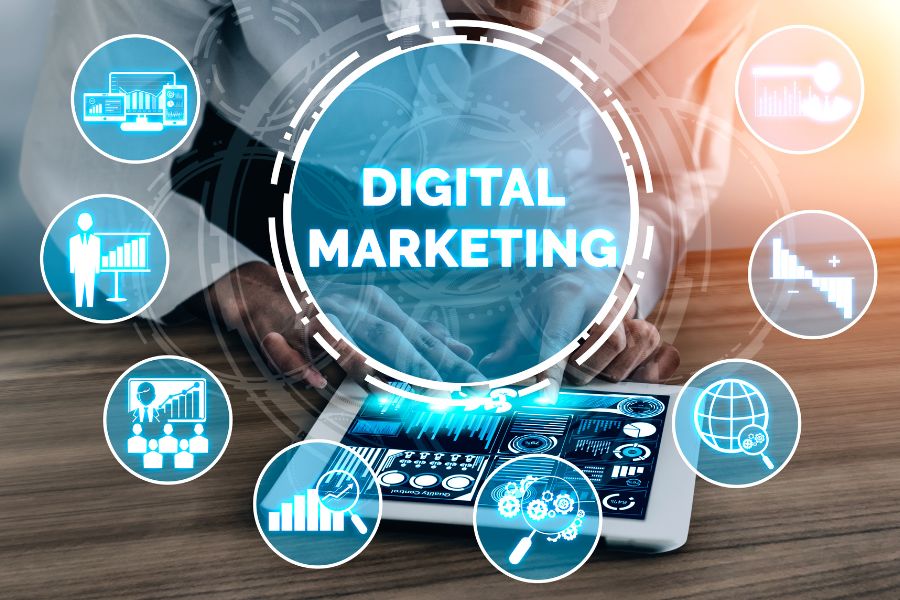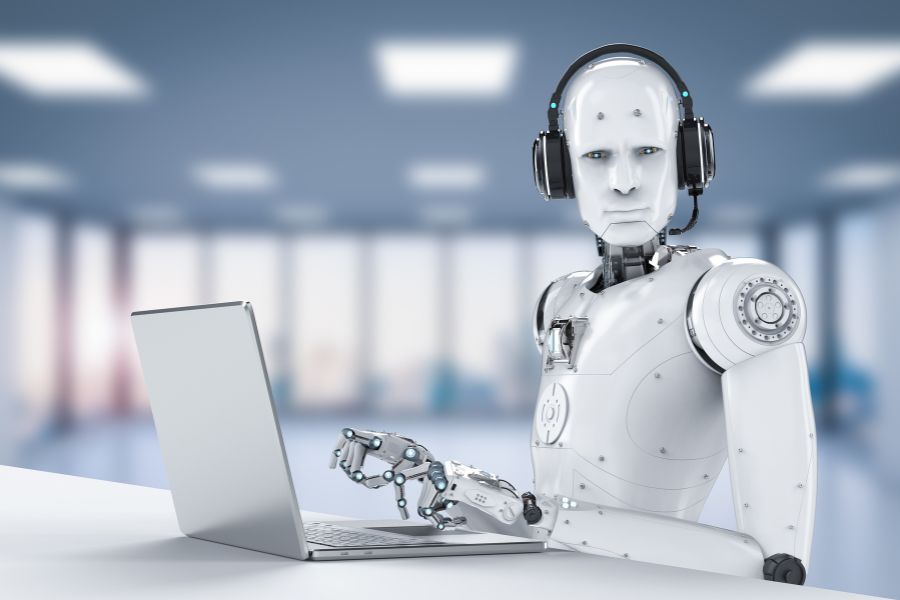Hey there visionary marketers! Today, let’s delve into the amazing world of Artificial Intelligence (AI) and how it’s revolutionizing marketing. Picture this: a world where every move you make is met with applause, where your campaigns resonate deeply with your audience, and where success feels effortless. I’m Ahmed Afridi, your friendly and result-oriented digital marketer, excited to show you the ropes when it comes to AI in our field. With Artificial Intelligence as our ally, we’ll transcend mere marketing and enter a realm of boundless creativity and connection, where captivating hearts and conquering markets is our reality. Ready to embark on this exhilarating journey together?
Introduction to Artificial Intelligence in Marketing
Let’s start with the basics. What’s all the hype about Artificial Intelligence (AI) in marketing? Well, think of AI as your super-smart sidekick in the digital world. It’s like having a helper who can crunch numbers, analyze data, and even create content for you.
But that’s just scratching the surface. Imagine Artificial Intelligence orchestrating mesmerizing campaigns based on evidence and real-time insights, predicting trends to drive revenue, boosting customer engagement to unprecedented levels, and turbocharging turnovers like never before. This isn’t just the future of marketing—it’s the reality, and it’s happening right now.
Automating Tasks with Artificial Intelligence (AI)

AI is akin to having your own personal assistant, seamlessly managing mundane tasks such as crunching numbers, sending emails, scheduling social media posts, and analyzing customer data. This liberates you to concentrate on the more enjoyable aspects of your work, such as brainstorming creative marketing ideas!
Sending Emails: You often find yourself sending similar emails. AI assistant can learn your writing style and draft personalized emails based on templates, freeing you to review and send them with a click.
Grammarly: https://www.grammarly.com/ (offers email composition AI)
Scheduling Social Media Posts: Need to keep your social media channels active but lack the time? An Artificial Intelligence assistant can analyze your audience engagement and automatically schedule pre-approved content at optimal times.
Buffer: https://buffer.com/ (provides AI-powered social media scheduling)
Analyzing Customer Data: Struggling to understand customer feedback? An AI assistant can analyze surveys, reviews, and social media mentions to identify key themes and sentiment, helping you improve your products and services.
Qualtrics: https://www.qualtrics.com/ (offers AI-powered text analysis for customer data)
Data Analysis and Insights
With AI and digital techniques, we harness the power to swiftly sift through vast amounts of data, uncovering valuable insights into consumer preferences and trends. This capability serves as a clandestine advantage in refining marketing strategies, enabling us to pinpoint audience preferences and optimize campaigns with precision.
Platforms like Google Analytics leverage Artificial Intelligence algorithms to provide marketers with in-depth insights into website traffic, user behavior, and conversion metrics.
Content Creation and Curation
Looking for exceptional content for your website or social media? AI tools have you covered, capable of swiftly whipping up engaging material akin to wielding a magic wand for content creation. With AI, you essentially have your own team of content creators at your fingertips, generating blog posts, videos, and graphics effortlessly. AI tools can create various content formats like blog posts, videos, and graphics, saving time and effort.
1. Blog Post Creation:
Tool: Jasper.ai (Generate a 1,500-word blog post on the “Top 5 Artificial Intelligence Trends to Watch in 2024″)
Tool: Rytr (Create a catchy headline and introduction for a blog post on “Sustainable Fashion Tips”)
2. Video Creation:
Tool: https://invideo.io/ (Generate a short explainer video on “How AI Works” with text-to-speech and animation)
Tool: https://lumen5.com/ (Create a social media video montage using AI-powered editing and music selection.)
3. Graphic Design:
Tool: Canva (Use AI-powered image generation to create unique visuals for blog posts or social media)
Tool: Simplified (Generate AI-powered infographics or data visualizations with your desired content.)
Email Marketing Automation

Say goodbye to spending hours scheduling emails because Artificial Intelligence can figure out the best time to send them, ensuring more people actually read them. Sending out personalized emails to your customers can be a real headache, but with AI, it’s a breeze! Tools like Mailchimp and Constant Contact utilize AI to analyze customer behavior and send out targeted emails at just the right time.
Email marketing platforms like Mailchimp leverage AI to automate email send times, segment subscribers based on engagement metrics, and personalize email content for higher engagement.
Personalizing Experiences with AI
Have you ever visited a website and felt like it knew exactly what you were looking for? That’s the magic of Artificial Intelligence at work, making your experience feel special and unique by analyzing your past behavior and preferences to tailor the content just for you!
1. E-commerce Recommendations:
- Example: You browse for hiking boots on an online store. Later, you see personalized ads and recommendations for related items like socks, backpacks, and hiking trails.
- Link: https://medium.com/@varun.khanchandani/predictive-analysis-netflix-and-spotify-can-read-your-mind-c78299f6df93
2. Streaming Services:
- Example: You watch a documentary on marine life on Netflix. Next, you see suggestions for similar documentaries, movies, and shows about the ocean.
- Link: https://www.music-tomorrow.com/blog/how-spotify-recommendation-system-works-a-complete-guide-2022
3. News Feeds:
- Example: You read articles about climate change on Facebook. Your feed starts showing related news, groups, and events on the topic.
- Link: https://en.wikipedia.org/wiki/Google_Personalized_Search
4. Educational Platforms:
- Example: You struggle with grammar on a learning app. The platform adapts and offers specific exercises and lessons to strengthen your grammar skills.
- Link: https://blog.duolingo.com/keeping-you-at-the-frontier-of-learning-with-adaptive-lessons/
5. Travel Apps:
- Example: You search for flights to Paris on a travel app. The app suggests hotels, restaurants, and activities based on your interests and previous travel history.
- Link: https://www.sitecore.com/products/sitecore-ai
Customer Segmentation and Targeting

AI enables us to better understand our customers by categorizing them based on their interests, demographics, and purchasing patterns. This segmentation facilitates the creation of tailored campaigns that resonate directly with our audience, ensuring that they receive content aligned with their preferences. This personalized approach replaces the outdated one-size-fits-all marketing strategy, resulting in mutually beneficial outcomes for both customers and businesses.
Platforms like Facebook Ads Manager utilize Artificial Intelligence to analyze user demographics and behaviors, allowing marketers to target specific audience segments with precision.
Dynamic Content Generation
Dynamic content, akin to a chameleon, adapts to the viewer, tailoring its presentation to their interests and preferences. Utilizing AI, websites can showcase personalized recommendations, drawing users in and encouraging return visits based on their past interactions and browsing behavior.
Retailers like Nike use AI to dynamically generate product recommendations based on a user’s browsing history, purchase behavior, and demographic profile, creating a tailored shopping experience for each visitor.
Chatbots and Virtual Assistants
Have you ever visited a website where a chat window pops up, offering assistance? That’s AI at work, ready to provide instant support whenever you require it, whether it’s navigating the site or finding answers to your questions. Chatbots and virtual assistants powered by Artificial Intelligence are here to enhance your experience, offering immediate guidance and support to ensure a smoother and more enjoyable customer journey.
Companies like Zendesk leverage AI chatbots to handle customer inquiries, provide product recommendations, and even facilitate transactions, enhancing the overall customer experience.
Driving Campaign Performance through Artificial Intelligence

Now, let’s talk about how Artificial Intelligence can supercharge your marketing campaigns and boost your ROI.
Predictive Analytics
By leveraging past data, AI functions as a predictive tool, offering insights into future trends and behaviors, essentially providing a crystal ball for marketing endeavors. For instance, when planning a summer sale, AI can analyze past patterns to forecast which products are poised to sell out first, enabling you to strategically manage your inventory.
A/B Testing and Optimization
Artificial Intelligence offers a solution to the challenge of optimizing performance by enabling the testing of various ideas in real-time. Rather than relying on guesswork, AI facilitates the continuous execution of mini experiments, akin to running multiple A/B tests automatically. This approach allows businesses to identify what truly works and make informed decisions based on real-time feedback, ultimately enhancing the effectiveness of ads and landing pages.
Real-time Decision Making
In today’s fast-paced world, every second counts, and we need to be able to make decisions quickly. With AI, you can make split-second decisions based on real-time data, ensuring that your marketing campaigns are always on point.
Ethical Considerations in Artificial Intelligence Marketing
But hey, with great power comes great responsibility, right? We need to make sure we’re using AI in a way that’s fair and respectful to everyone.
Data Privacy and Security
It’s important to keep people’s data safe and secure. We need to make sure we’re only using it in ways that people are comfortable with.
Transparency and Accountability

We need to be honest about how we’re using AI in our marketing, ready to take responsibility for any mistakes. This involves maintaining clear documentation on AI implementation, promptly addressing customer inquiries or concerns regarding data usage and AI applications, and conducting regular audits to ensure compliance with privacy regulations and ethical standards. These steps foster professionalism and trust in our AI-driven strategies.
Mitigating Bias and Discrimination
To ensure AI operates effectively, it’s crucial to train it on diverse and inclusive data, preventing unintended discrimination. This involves regularly evaluating data for biases and employing detection algorithms to recognize and rectify any discriminatory language, racial slurs, or gender-based stereotypes in AI-generated content. Upholding ethical standards and promoting inclusivity are essential components of this process.
Future Trends and Implications
The future of Artificial Intelligence in marketing is incredibly promising, as indicated by a recent study published in the McKinsey Quarterly in October 2023. Predictive algorithms forecast a substantial move towards hyper-personalization, foreseeing a potential 45% surge in customer engagement and a 50% increase in conversion rates by 2025. This offers solid evidence of the transformative impact of AI-driven marketing strategies, shaping an exciting trajectory for the industry.
Advancements in AI Technology
As AI continues to advance, we’ll unlock even more exciting capabilities. With the refinement of Artificial Intelligence algorithms, we can anticipate enhanced predictive analytics, empowering businesses to optimize resource allocation and marketing strategies in real-time, ultimately maximizing ROI and maintaining a competitive edge.
Impact on Marketing Strategies

Artificial Intelligence is revolutionizing marketing practices, offering innovative avenues to reach audiences effectively. Through AI-powered insights, guerrilla marketing tactics can be enhanced, allowing for targeted engagement with niche demographics. Moreover, AI’s incorporation of marketing psychology and consumer behavior analysis enables strategic utilization of pricing strategies, leveraging decoy effects and price psychology to influence purchasing decisions and boost revenue. Additionally, AI’s capacity to analyze market dynamics empowers marketers to anticipate trends, customizing strategies for sustained success in today’s dynamic business landscape, supported by data-driven analytics.
Opportunities and Challenges
With Artificial Intelligence on our side, we have the tools to overcome challenges and keep moving forward. By harnessing powerful marketing-specific tools like sentiment analysis, natural language processing (NLP), and predictive modeling, we streamline workflows, automate repetitive tasks, and extract actionable insights from vast datasets. These game-changing tools empower us to adapt quickly and stay ahead of the curve in marketing strategies, transforming challenges into opportunities for growth and innovation.
Conclusion
In conclusion, Artificial Intelligence (AI) is changing the game for marketers everywhere. With its ability to automate tasks, personalize experiences, and drive campaign performance, AI is revolutionizing the way we do marketing. So let’s embrace the power of AI and see where it takes us!
Artificial intelligence (AI) | Definition, Examples, Types Read More.
FAQs on Artificial Intelligence (AI) in Marketing
What is the role of AI in marketing?
AI in marketing acts as a smart assistant, crunching data, analyzing insights, automating tasks, and even creating content. It revolutionizes marketing by offering personalized experiences, driving campaign performance, and enhancing customer engagement.
How does AI automate tasks in marketing?
AI automates tasks such as sending emails, scheduling social media posts, analyzing customer data, and even generating content. It saves time and effort, allowing marketers to focus on strategic planning and creativity.
Can you provide examples of AI-powered tools for marketing automation?
Certainly! Tools like Grammarly for email composition, Buffer for social media scheduling, and Qualtrics for text analysis of customer data are some examples of AI-powered tools used in marketing automation.
How does AI contribute to data analysis and insights in marketing?
AI enables marketers to sift through vast amounts of data quickly, providing valuable insights into consumer preferences and trends. Platforms like Google Analytics leverage AI algorithms to offer in-depth insights into website traffic, user behavior, and conversion metrics.
What are some examples of AI tools for content creation and curation?
There are various AI tools for content creation, such as Jasper.ai and Rytr for generating blog posts, InVideo for creating videos, and Canva for graphic design. These tools streamline the content creation process and help marketers produce engaging material efficiently.

